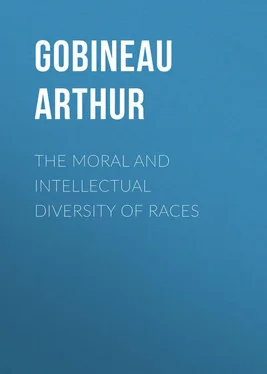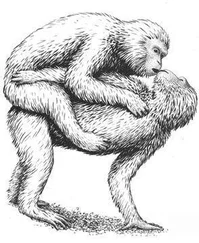Arthur Gobineau - The Moral and Intellectual Diversity of Races
Здесь есть возможность читать онлайн «Arthur Gobineau - The Moral and Intellectual Diversity of Races» — ознакомительный отрывок электронной книги совершенно бесплатно, а после прочтения отрывка купить полную версию. В некоторых случаях можно слушать аудио, скачать через торрент в формате fb2 и присутствует краткое содержание. Жанр: История, foreign_antique, foreign_prose, на английском языке. Описание произведения, (предисловие) а так же отзывы посетителей доступны на портале библиотеки ЛибКат.
- Название:The Moral and Intellectual Diversity of Races
- Автор:
- Жанр:
- Год:неизвестен
- ISBN:нет данных
- Рейтинг книги:4 / 5. Голосов: 1
-
Избранное:Добавить в избранное
- Отзывы:
-
Ваша оценка:
- 80
- 1
- 2
- 3
- 4
- 5
The Moral and Intellectual Diversity of Races: краткое содержание, описание и аннотация
Предлагаем к чтению аннотацию, описание, краткое содержание или предисловие (зависит от того, что написал сам автор книги «The Moral and Intellectual Diversity of Races»). Если вы не нашли необходимую информацию о книге — напишите в комментариях, мы постараемся отыскать её.
The Moral and Intellectual Diversity of Races — читать онлайн ознакомительный отрывок
Ниже представлен текст книги, разбитый по страницам. Система сохранения места последней прочитанной страницы, позволяет с удобством читать онлайн бесплатно книгу «The Moral and Intellectual Diversity of Races», без необходимости каждый раз заново искать на чём Вы остановились. Поставьте закладку, и сможете в любой момент перейти на страницу, на которой закончили чтение.
Интервал:
Закладка:
The monuments of Sanscrit literature, the magnificent remains of palaces and temples, the great number of ingenious arts, the elaborate systems of metaphysics, attest a state of intellectual culture, far from contemptible, among the Hindoos. Yet their civilization, too, we term a semi-civilization, albeit it is as little like the Chinese as it is like anything ever seen in Europe.
Few who will carefully investigate and reflect upon these facts, will doubt that the terms Hindoo, Chinese, European civilization, are not indicative of degrees only, but mean the respective development of powers essentially different in their nature. We may consider our civilization the best, but it is both arrogant and unphilosophical to consider it as the only one, or as the standard by which to measure all others. This idea, moreover, is neither peculiar to ourselves nor to our age. The Chinese even yet look upon us as barbarians; the Hindoos probably do the same. The Greeks considered all extra-Hellenic peoples as barbarians. The Romans ascribed the same pre-excellency to themselves, and the predilections for these nations, which we imbibe already in our academic years from our classical studies, cause us to share the same opinion, and to view with their prejudices nations less akin to us than they. The Persians, for instance, whom the Greeks self-complacently styled outside-barbarians, were, in reality, a highly cultivated people, as no one can deny who will examine the facts which modern research has brought to light. Their arts, if not Hellenic, still attained a high degree of perfection. Their architecture, though not of Grecian style, was not inferior in magnificence and splendor. Nay, I for one am willing to render myself obnoxious to the charge of classical heresy, by regarding the pure Persians as a people, in some respects at least, superior to the Greeks. Their religious system seems to me a much purer, nobler one than the inconsistent, immoral mythology of our favorites. Their ideas of a good and an evil power in perpetual conflict, and of a mediator who loves and protects the human race; their utter detestation of every species of idolatry, have to me something that prepossesses me in their favor.
I have now alleged, in a cursory manner, my principal reasons for considering civilizations as specifically distinct. To further dilate upon the subject, though I greatly desire to do so, would carry me too far; not, indeed, beyond the scope of the inquiries proposed in this volume, but beyond the limited space assigned for my introduction. I shall add only, that – assuming the intellectual equality of all branches of the human family – we can assign no causes for the differences of degree only of their development. Geographical position cannot explain them, because the people who have made the greatest advance, have not always been the most favorably situated. The greatest geographical advantages have been in possession of others that made no use of them, and became of importance only by changing owners. To cite one of a thousand similar instances. The glorious Mississippi Valley, with its innumerable tributary streams, its unparalleled fertility and mineral wealth, seems especially adapted by nature for the abode of a great agricultural and commercial nation. Yet, the Indians roamed over it, and plied their canoes on its rivers, without ever being aware of the advantages they possessed. The Anglo-Saxon, on the contrary, no sooner perceived them than he dreamed of the conquest of the world. We may therefore compare such and other advantages to a precious instrument which it requires the skill of the workman to use. To ascribe differences of civilizations to the differences of laws and political institutions, is absolutely begging the question, for such institutions are themselves an effect and an inherent portion of the civilization, and when transplanted into foreign soils, never prosper. That the moral and physical well-being of a nation will be better promoted when liberty presides over her councils than when stern despotism sits at the helm, no one can deny; but it is obvious that the nation must first be prepared to receive the blessings of liberty, lest they prove a curse.
Here is the place for a few remarks upon the epithet Christian, applied to our civilization. Mr. Gobineau justly observes, that he knows of no social or political order of things to which this term may fitly be said to belong. We may justly speak of a Brahminic, Buddhistic, Pagan, Judaic civilization, because the social or political systems designated by these appellations were intimately connected with a more or less exclusive theocratical formula. Religion there prescribed everything: social and political laws, government, manners, nay, in many instances, dress and food. But one of the distinguishing characteristics of Christianity is its universality. Right at the beginning it disclaimed all interference in temporal affairs. Its precepts may be followed under every system of government, in every path of life, every variety of modes of existence. Such is, in substance, Mr. Gobineau's view of the subject. To this I would add a few comments of my own. The error is not one of recent date. Its baneful effects have been felt from almost the first centuries of the establishment of the Church down to our times. Human legislation ought, indeed, to be in strict accordance with the law of God, but to commend one system as Christian, and proscribe another as unchristian, is opening the door to an endless train of frightful evils. This is what, virtually, they do who would call a civilization Christian, for civilization is the aggregate social and political development of a nation, or a race, and the political is always in direct proportion to the social progress; both mutually influence each other. By speaking of a Christian civilization, therefore, we assert that some particular political as well as social system, is most conformable to the spirit of our religion. Hence the union of church and State, and the influence of the former in temporal affairs – an influence which few enlightened churchmen, at least of our age, would wish to claim. Not to speak of the danger of placing into the hands of any class of men, however excellent, the power of declaring what legislation is Christian or not, and thus investing them with supreme political as well as spiritual authority; it is sufficient to point out the disastrous effects of such a system to the interests of the church itself. The opponents of a particular political organization become also the opponents of the religion which advocates and defends it. The indifferentism of Germany, once so zealous in the cause of religion, is traceable to this source. The people are dissatisfied with their political machinery, and hate the church which vindicates it, and stigmatizes as impious every attempt at change. Indeed, one has but to read the religious journals of Prussia, to understand the lukewarmness of that people. Mr. Brace, in his Home Life in Germany , says that many intelligent natives of that country had told him: Why should we go to church to hear a sermon that extols an order of things which we know to be wicked, and in the highest degree detestable? How can a religion be true which makes adherence to such an order a fundamental article of its creed?
One of the features of our constitution which Mr. De Tocqueville most admires, is the utter separation of church and State. Mere religious toleration practically prevails in most European countries, but this total disconnection of the religious from the civil institutions, is peculiar to the United States, and a lesson which it has given to the rest of the world.
I do not mean that every one who makes use of the word Christian civilization thereby implies a union of church and State, but I wish to point out the principle upon which this expression is based, viz: that a certain social and political order of things is more according to the spirit of the Christian religion than another; and the consequences which must, or at least may, follow from the practical acceptation of this principle. Taking my view of the subject, few, I think, will dispute that the term Christian civilization is a misnomer. Of the civilizing influence of Christianity, I have spoken before, but this influence would be as great in the Chinese or Hindoo civilizations, without, in the least, obliterating their characteristic features.
Читать дальшеИнтервал:
Закладка:
Похожие книги на «The Moral and Intellectual Diversity of Races»
Представляем Вашему вниманию похожие книги на «The Moral and Intellectual Diversity of Races» списком для выбора. Мы отобрали схожую по названию и смыслу литературу в надежде предоставить читателям больше вариантов отыскать новые, интересные, ещё непрочитанные произведения.
Обсуждение, отзывы о книге «The Moral and Intellectual Diversity of Races» и просто собственные мнения читателей. Оставьте ваши комментарии, напишите, что Вы думаете о произведении, его смысле или главных героях. Укажите что конкретно понравилось, а что нет, и почему Вы так считаете.












